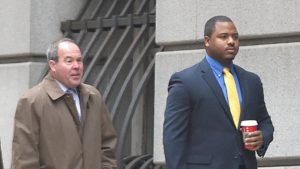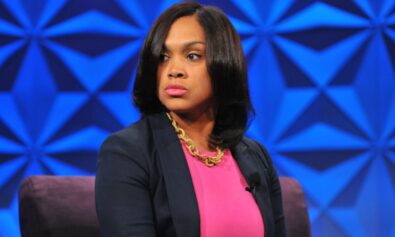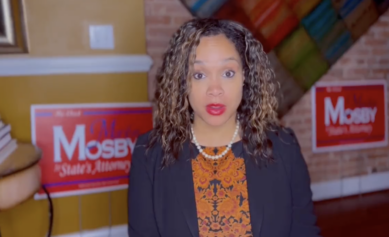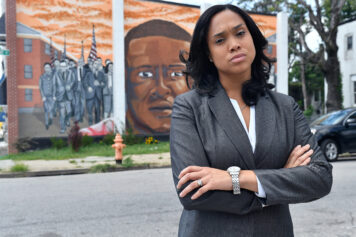
Officer William Porter arrives in Baltimore court for the first day of trials in the Freddie Gray case. (Photo: Kenneth K. Lam/Baltimore Sun)
On Monday, jury selection begins for the trial of the first of six Baltimore police officers charged in the arrest and death of Freddie Gray. In April, Gray, 25 was arrested, and died from injuries he sustained while in a police transport van while in police custody. The man’s death became a flashpoint in the #BlackLivesMatter movement against police brutality and violence, and for reform of the criminal justice system.
The first officer on trial is William Porter, 26, who is charged with involuntary manslaughter, reckless endangerment and assault in Gray’s death. Porter is accused of failing to get Gray medical attention during the 45-minute trip in the police van, which made several stops. Gray was handcuffed, and subsequently his legs were shackled and he was placed in the back of the van without a seatbelt, which the prosecution notes is a violation of police department policy. Ultimately, Gray was found unresponsive, and he was taken to the hospital, where he died a week later due to a spinal injury. Gray, who was unarmed, had not been charged with a crime.
Porter told police investigators that it “was always a big scene” when Gray was arrested, according to documents filed by the defense. Porter also claimed he knew of a prior arrest when Gray allegedly attempted to kick out the windows of a police vehicle.
According to USA Today, the jury selection process in Porter is significant, as it could determine whether the six officers are able to have impartial juries selected in their cases. Lawyers for the police officers do not think this is possible. In addition, Porter is being tried first, in part, because prosecutors want to use him as a witness against several of the other officers, according to ABC News.
Porter is one of three Black defendants charged in connection with Gray’s death. Three white officers were indicted as well.
A small group of protesters assembled in front of the court house, according to the Baltimore Sun. In a statement, activist Rev. CD Witherspoon said, “It is not enough to indict the police; we must remain vigilant in our demand that justice be done in this case and all the other cases of police terror and killings. We continue to say indict, convict, and jail killer police.”
In Baltimore, the stakes are high in this first of a series of trials. The death of Freddie Gray demonstrates the power of protest and its potential effects on the political system. Gray became intertwined with the #BlackLivesMatter movement, shining yet another spotlight on police violence. Further, the protest and civil unrest that followed Gray’s death helped to focus attention on the systemic racial discrimination and economic exploitation facing poorer Black residents in the city of Baltimore.
Already, the incident and the events surrounding it have had profound implications for the city’ political actors. As a result, Baltimore Police Commissioner Anthony Batts was unceremoniously ousted in July. Meanwhile, Mayor Stephanie Rawlings-Blake, who faced criticism for failing to appear for hours after the unrest began, then angering the public and protesters alike for calling Baltimore residents “thugs” and enacting a curfew. Within this context, Rawlings-Blake decided not to seek reelection.
Without an incumbent in the mayoral race, there are beneficiaries, including former mayor Sheila Dixon, who was forced to resign after being convicted of embezzling $500 in gift cards for poor children. Dixon announced her candidacy this past summer. But perhaps the biggest beneficiaries of the power vacuum created in the aftermath of the Freddie Gray case are Marilyn Mosby, the young state’s attorney who assumed office in January and charged the officers in May, and her husband, councilman Nick Mosby, who declared his mayoral bid after Rawlings-Blake bowed out.
Meanwhile, as Judge G. Barry Williams presided over the first day of jury selection, it became clear that all prospective jurors knew about the case. When Williams asked the men and women if they had not heard of the Gray case, none raised their hands, as the Baltimore Sun reported. In addition, all indicated they had heard about the $6.4 million civil settlement paid to Gray’s family, and the curfew the mayor issued during the April unrest.
The community is expected to watch this case closely, and the local NAACP chapter plans to have a “court watcher” in attendance throughout the trial, which the judge said would likely not go past December 17. The trial will likely “provide fresh details about how Gray suffered a severe spinal injury while being transported in a police van,” according to the Washington Post. Porter is expected to take the stand.


